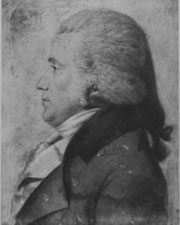William H. Wells
| William H. Wells | |
|---|---|
 |
|
|
United States Senator from Delaware |
|
|
In office May 28, 1813 – March 3, 1817 |
|
| Preceded by | James A. Bayard |
| Succeeded by | Nicholas Van Dyke |
|
In office January 17, 1799 – November 6, 1804 |
|
| Preceded by | Joshua Clayton |
| Succeeded by | James A. Bayard |
| Member of the Delaware House of Representatives | |
|
In office January 6, 1795 - January 7, 1800 January 1, 1811 - January 5, 1814 January 5, 1819 – January 4, 1820 |
|
| Personal details | |
| Born |
January 7, 1769 Burlington, New Jersey |
| Died | March 11, 1829 (aged 60) Dagsboro, Delaware |
| Political party | Federalist |
| Spouse(s) | Rachael Dagworthy |
| Residence | Dagsboro, Delaware |
| Profession | lawyer |
William Hill Wells (January 7, 1769 – March 11, 1829) was a lawyer and politician from Dagsboro, in Sussex County, Delaware. He was a member of the Federalist Party, who served in the Delaware General Assembly and as U.S. Senator from Delaware.
Wells was born in Burlington, New Jersey. His family came to Sussex County when he was young, and his father began a successful mercantile business at Dagsboro, which the younger Wells continued. His father, Richard Welles (1734–1801), was born in Kingston upon Hull in England. His marriage to Rachael Dagworthy, the daughter of Revolutionary War General John Dagworthy, greatly increased his wealth, as she had inherited large tracts of Sussex County timberlands. Meanwhile he studied the law, was admitted to the Delaware Bar in 1791, and practiced at Georgetown, Delaware, eventually expanding his practice to Dover, Delaware.
Wells represented Sussex County for several years in the Delaware General Assembly, initially serving in the State House from the 1795 session through the 1799 session. He was then elected as a Federalist to the United States Senate to fill the vacancy caused by the death of Joshua Clayton and served from January 17, 1799 until November 6, 1804. During this time he joined his Federalist colleagues in opposition to the Louisiana Purchase. He resigned before the completion of his term to seek his fortune in the oil business in northern Pennsylvania. He returned to the State House for the 1811 and 1812 sessions, and spent the 1813 session in the State Senate. He was again elected as a Federalist to the United States Senate to fill the vacancy caused by the resignation of James A. Bayard, and served from May 28, 1813, to March 3, 1817. Finally, he served once more in the 1819 session of the State House.
...
Wikipedia
